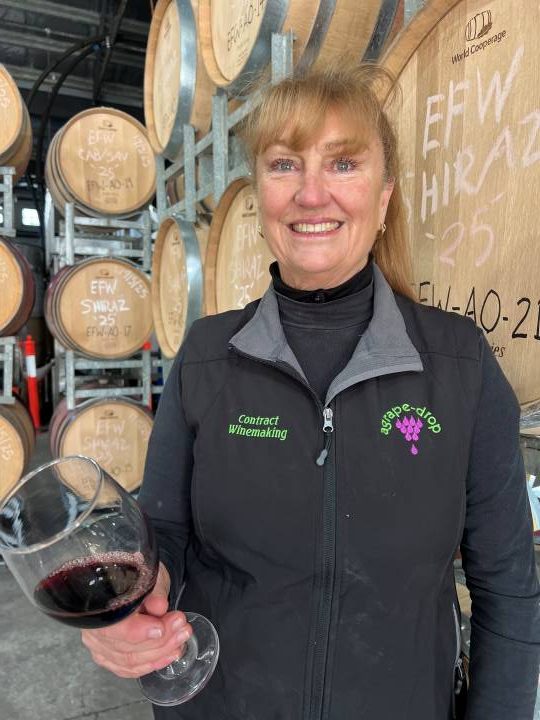
Michelle Crockett
WINEMAKER AT ELING FOREST WINERY
“I love to see people’s face light up as they taste something new.”
When did you realise you wanted to become a winemaker?
Thirty years ago, I first thought about the possibility of making wine. I had an interest in a farm located just out of Sydney, where I was considering planting grapes. I wondered out loud what wine making courses were available. The next year I applied and was accepted to Charles Sturt University at Wagga Wagga, New South Wales
Please tell us about your career so far, including your education, workexperience etc.
My first position in a winery was as a lab assistant at Vickarys Winery, Luddenham, in the Sydney region. Whilst working there I also started some part-time work at Joadja Winery, which brought me to the Southern Highlands and that’s when I applied to university. Soon after that I started working at Eling Forest Winery. The winemaker at the time was an eighty-three-year-old Hungarian gentleman, Leslie Fritz, who pioneered the varieties Harslevelu and Furmint in Australia. In 2001, I was extremely lucky to do a short vintage in Piedmont, Italy where I was able to experience the old-world craft of winemaking tradition, adapting some of these techniques into my winemaking style. I completed my Bachelor of Applied Wine Making in 2005. I also have been able to enjoy time as a wine educator – teaching at TAFE NSW and guest lecturing at Bostin University, Sydney campus.
What do you love most about being a winemaker?
Every day is a new adventure. No two vintages are the same. Harvest is a time when the whole region is holding its breath until the harvest is completed.
I’m always trying to adapt while learning and improving on previous vintages. That’s why you love being a winemaker in the Southern Highlands – because here, your passion meets its perfect terroir. What’s not to love about the Southern Highlands? It’s an amazing, magical place to live, work or visit. It has a definite four seasons, which is a great advantage when growing grapes. The terroir definitely gives wine its identity and the long cool growing season allows the grapes to retain their natural acidity and their natural fruit flavours.
What is your favourite wine, and what food do you typically pair it with?
I’m definitely a bubbles girl. I love sparkling wines and Champagne. I do love to pair it with some oysters, smoke salmon or soft cheese. But I could probably eat anything with good bubbles.
Is there a specific process you follow when developing a new wine?
Adding a new wine to the portfolio always takes a lot of brainstorming. I start by thinking about a wine style that could complement the existing wines. The availability of grapes to suit that style is also a major part. Price point and markets are also a big consideration. But to be honest, sometimes the wine just tells you what it wants to be.
Is there any vintage you’re particularly proud of creating? Why?
The 2001 vintage will always hold a special place in my heart. It was the first of the bigger and bolder styles of cabernet sauvignon and shiraz that we still try to replicate today.
How does the local climate/soil affect the wine you make?
The soil and the climate are all obstacles to inspire and challenge you. Cool climate grown grapes have their owns unique characteristics. The longer, cool growing season lends itself well to fresh, elegant wine styles.
Which of your own varieties do you typically indulge in?
As I said before I am really a bubbles girl, but I do enjoy all wines. It usually depends on the mood I’m in and the company I am enjoying a glass or two with.
Where do you see yourself in five years? How do you think your winemaking will evolve during this time?
I think in the next five years Eling Forest will explore a bit more of the low/no alcohol styles that are becoming very popular. We are always looking at styles that are trending, but most of our wines are traditional. Making wine is a bit like having children and watching them grow. I get a deep satisfaction of watching the wines I make evolve and develop from vine to glass.
If there is anything else you would like to add, please do so below.
Winemaking has been an amazing career. Let’s face it, most people are intrigued with the winemaking process and love to chat or learn about wines. I love to see people’s faces light up as they taste something new. Loving wines and always looking to improve or adjust styles has led me to travel and work in many of the world’s best wine regions and meet some amazing people along the way. Wine does really become your life.
